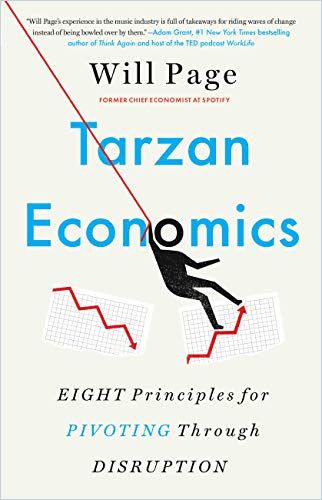Will Page offers a charming, idiosyncratic tour through the complexities of the digital marketplace and the need to keep up with it.

Leap Into the Future
Author Will Page is the former chief economist at Spotify. He helped create the structure of its catalog and argued in support of a global music copyright. He also believes that the music industry thrived only when it stopped fighting online piracy. This is only one example – he offers many – of the necessity of adapting to changes in markets and practices. In engaging, quirky prose, Page covers the challenges affecting many sectors and advises business leaders to behave like Tarzan traversing the jungle: Be willing to let go of one vine – an outmoded business model – and grab another.
Tarzan Not Dumb
Tarzan economics refers to the fictional character who traveled the jungle by swinging from vine to vine. Page coins the phrase “Tarzan economics” to describe the legacy music industry, which clung to a profitable old vine – compact discs – and refused to grab a new one – digital music. An early target of disruptive technology, the music industry learned to pivot the hard way.
Navigating disruption requires the confidence of knowing when to let go of old ideas and grab onto new ones.Will Page
In 2000, the music industry’s value was $25 billion. Today, its value is a fraction of that and continuing to shrink. When the first file sharing services came online in the early 2000s, music publishers pursued legal actions against consumers for downloading pirated music.
But Page underscores that music fans preferred cheaper, faster online music. He notes that in the United States, a person’s average annual spending on music plunged from $61 in 2004 to $29 in 2019. The music industry survived, Page believes, thanks to the rise of Spotify and other streaming services. Today, Americans spend an average of $81 annually on music subscriptions. The music industry rebounded when it let go of old vines and reached for new ones.
Consumer Attention
Page makes a less convincing argument when he claims that due to the infinite variety of entertainment choices constantly available on every device, boredom no longer exists. But anyone who’s spent an hour scrolling through possible choices on, say, Netflix, without finding anything appealing, knows that boredom is alive and well. And that more choices often mean greater levels of boredom.
The challenge we all face in trying to draw a crowd is that there is now so much more of everything.Will Page
Page explains that modern culture supports “attention merchants,” product purveyors who vie for limited consumer attention. To make this case, Page notes that hit songs have got shorter, on average, by 20 seconds between 2013 and 2018. This reflects intense competition for attention.
Radiohead
Page finds worthy lessons in the victory by surrender of Radiohead, which let fans download its 2007 album, In Rainbow, from its website and pay what they wanted – including paying nothing at all. The free download ended after three months as Radiohead switched to selling In Rainbows for £40 in a boxed set containing the album and two CDs.
The CD debuted at number one in the United States and the United Kingdom. The band wooed bargain hunters with free downloads, satisfied hard-core fans with a luxury version and offered a traditional CD. Radiohead sold out its subsequent tour.
Pivotal Thinking
During a long-ago family trip to the beach, Page’s father asked him how he would prevent the drowning deaths then occurring along the British coastline. Page responded with rationality: Require swimming lessons for all children. Page’s father said more swimmers would mean more people braving dangerous conditions and, ultimately, more drownings.
Page’s reply exemplified “rational thinking,” which follows established rules to reach a flawed answer. Pivotal thinking ignores the old rules under the banner of “the opposite of a good idea can be a good idea.” For preventing drownings, a system of red-yellow-green flags signaling safe or unsafe ocean conditions proved a wiser solution.
Opaque Consumer Motivation
Page agrees with management consultant and author Peter Drucker, who said, “The customer rarely buys what the company thinks it is selling.” In the case of books, he says many consumers view their purchases as aspirational rather than practical.
Page says that 80% of real paper book purchasers never read the books they buy. Here he does fanatical readers and book buyers a great service; most will relate to that statistic. And many will be overjoyed to read that they are not alone in that habit. Just because a consumer buys a CD or a newspaper doesn’t mean he or she consumes the contents. As with gym memberships, a consumer may pay for something he or she never uses. But, as Page emphasizes, “use” can be applied loosely. The pleasure of owning a desired book does provide satisfaction, even if the owner never cracks a page.
Question Data
Page asked Richard Thaler – the University of Chicago Nobel Prize-winning economist who made a career of finding irrationality in human decisions – why Spotify’s “Discover Weekly” playlists were hits while other playlists under different names flopped.
Unless it’s understood properly, data prove to be a more compelling liar than even the most gifted of thieves.Will Page
Page and his team delved into the metrics around this question, but the data revealed no cause. Thaler understood: Spotify released the successful playlist on Mondays.
Thaler pointed Page to the “fresh start” effect – humans are more willing to try something new at the dawn of a “mental accounting” period, such as a week, month or year. Thus, Page emphasizes, data are as likely to obscure the truth as to reveal it.
Sideways Thinking
Writing with a bemused compassion for the foibles of human nature, Page informs readers – without excessive detail – how the digital economy functions and how at ease that economy is with apparent contradictions and nonlinear conclusion drawing. His examples illustrate his points with an engaging metaphorical depth. Readers will savor his knowledge and unusual wit.





